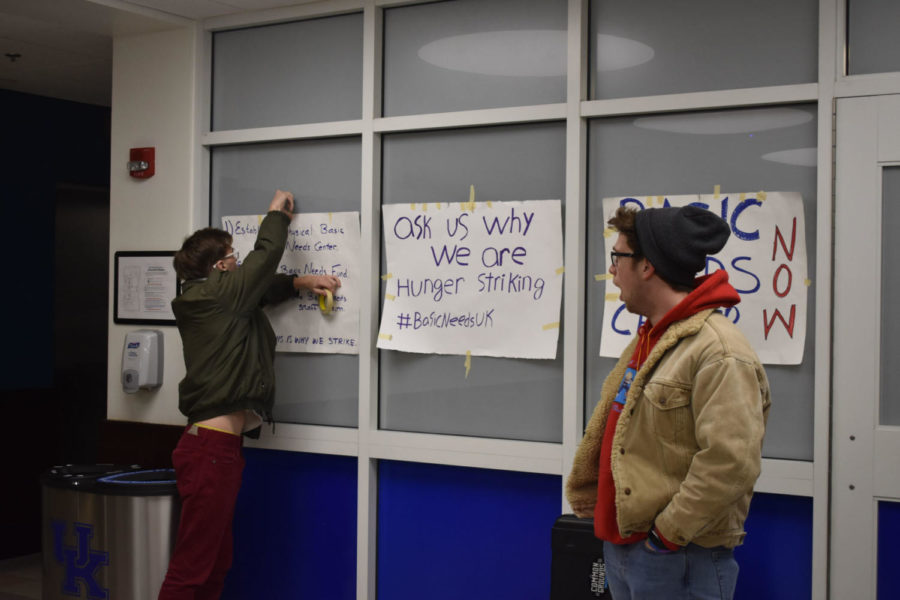‘Students want to see change.’ UK students occupy campus building.
April 1, 2019
Students led by the Black Student Advisory Council and Basic Needs campaign began to occupy the Main Building on Monday evening in support of their campaigns for action from the administration.
“Our dialogue at this point is all or nothing,” said Tsage Douglas, president of the Black Student Union. “Either you meet our demands and meet them on our terms or we’re not accepting it.”
The students plan to occupy the Main Building overnight on Monday so that they can meet with UK administrators when they arrive on Tuesday morning. As of 10 p.m., one UK Police officer was present in the building with the students.
The Black Student Advisory Council has five requests for the administration: a permanent seat on search committees for administrative officials, revising the William C Parker Scholarship, standardizing the role of Diversity and Inclusion Officers, releasing the findings from the 2016 Cook Ross Survey and taking down the mural in Memorial Hall.
The Basic Needs Campaign has its own list of demands relating to food and housing insecurity among UK students. Members of the Basic Needs campaign began a hunger strike last week as another form of protest.
Both groups are using the hashtag #OccupyUK to promote the occupation on social media.
The occupation began after a town hall hosted by the Black Student Advisory Council to discuss minority issues on campus. The town hall, a follow-up to an all-call meeting in October, went over meetings between the Council and administration about the Council’s demands.
“There are resources, it’s about allocating those resources,” said Chandler Frierson, a founding member of Black Student Advisory Council, during the town hall, of UK’s approach to minority issues.
Lidya Azad, a Basic Needs Campaign organizer, is on her fifth day of the hunger strike. She said the occupation was warranted because “it’s also [black students] another under-represented, marginalized and oppressed group in both the society and this institution.”
“The hunger strike was a really large step, and I think that shouldn’t be understated,” said Azad, “so I would argue that was a really large step and this is just a continuation of it.”
She said that other hunger strikers are fainting, seeing spots and experiencing low blood pressure.
Azad previously ran as vice president for UK’s Student Government Association, through which she formed connections with the leaders of black student groups on campus.
Black Student Advisory Council extended an offer to the Basic Needs Campaign to join in the occupation.
“Coming together at similar times shows administrators that students have power in numbers,” said Frierson, who continued about the intersectionality of need on campus.
“Black Student Advisory Council realized that they were getting the same run around that we were from the administration and decided why don’t we just use our power together to put pressure on the administration for them to concede to our very very simple demands,” said Azad.
The Black Student Advisory Council has been planning the occupation for around three weeks, according to Frierson. He said they decided to pursue an occupation after they felt meetings with university officials did not yield enough progress.
“Six months later, we haven’t really achieved anything, then you know, now it’s time to take a different route,” Frierson said.
Azad said that in a Monday morning meeting with Provost David Blackwell, UK Presidential Chief of Staff Bill Swinford and Assistant Provost for Health and Wellness Drew Smith, she was told administrators would not meet with the Basic Needs Campaign until they ended the hunger strike.
UK confirmed the meeting, but Blanton said that the administrators “made clear that they would be willing to meet with the students.”
The two organizations are separate entities with separate goals, emphasized Frierson, but he said he felt positive about the occupation so far.
“Students are ready,” Frierson said. “Students want to see change.”
































































































































































